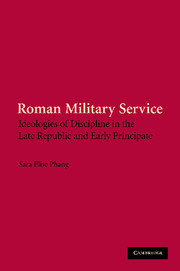Book contents
- Frontmatter
- Contents
- Preface and Acknowledgments
- Abbreviations
- General Introduction
- 1 Theorizing Disciplina: Social Conflict, Legitimation, and Power
- 2 Combat Training and Discipline
- 3 Viri Militares: Habitus and Discipline
- 4 Disciplina and Punishment
- 5 Disciplining Wealth: The Ideologies of Stipendia and Donativa
- 6 Labor Militaris: Work as Discipline
- 7 Feasts of Mass Destruction: Disciplina and Austerity
- General Conclusion
- Bibliography
- Index
5 - Disciplining Wealth: The Ideologies of Stipendia and Donativa
Published online by Cambridge University Press: 27 July 2009
- Frontmatter
- Contents
- Preface and Acknowledgments
- Abbreviations
- General Introduction
- 1 Theorizing Disciplina: Social Conflict, Legitimation, and Power
- 2 Combat Training and Discipline
- 3 Viri Militares: Habitus and Discipline
- 4 Disciplina and Punishment
- 5 Disciplining Wealth: The Ideologies of Stipendia and Donativa
- 6 Labor Militaris: Work as Discipline
- 7 Feasts of Mass Destruction: Disciplina and Austerity
- General Conclusion
- Bibliography
- Index
Summary
INTRODUCTION
This chapter focuses on disciplina's control of the income of soldiers, including stipendia (wages or salaries), praemia (pensions and other benefits), extrainstitutional income, and donativa. Donativa were occasional gifts in cash, usually given by emperors on the occasion of a triumph, imperial accession, or other dynastic or political event. Disciplinary ideology and practice sought control over soldiers' acquisition of wealth from these sources. The imperial aristocracy regarded soldiers' access to wealth as at best unmerited, at worst illegitimate.
In more specific terms, the discipline of soldiers' income sought to routinize the remuneration of soldiers, stabilizing the imperial power by discouraging ambitious individuals' patronage of the army. The warlords of the late Republic were to some degree patrons of their soldiers, who were dependent on their leaders for pay, distribution of booty, and irregular pensions. Remuneration in this period had a charismatic and irregular quality, dependent on the general's success and ruthlessness. With the establishment of the Principate, the emperors needed to routinize and make legitimate the pay and benefits of soldiers, who could no longer be compensated by dispossessing other social groups in Italy.
The discipline of soldiers' remuneration was partly achieved through formally rational, bureaucratic means. Thus, Augustus regularized terms of service and established a special military treasury funded by new taxation in order to pay soldiers' pensions. Surviving documents and literary testimonia suggest that military stipendia were subject to formally rational accounting.
- Type
- Chapter
- Information
- Roman Military ServiceIdeologies of Discipline in the Late Republic and Early Principate, pp. 153 - 200Publisher: Cambridge University PressPrint publication year: 2008



